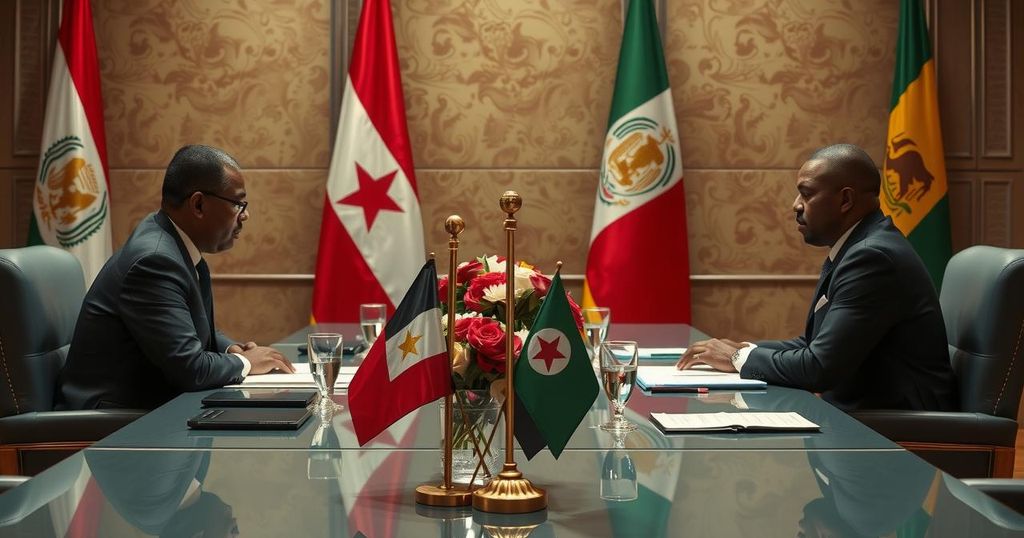Ethiopia seeks to replace Somalia’s Foreign Minister Ahmed Fiqi, facing opposition from Egypt amid Somali President Hassan Sheikh Mohamud’s visit to Ethiopia. This visit culminated in the official resumption of diplomatic relations, while Fiqi is engaged in discussions in Egypt. Analysts express concern over the implications for Somalia’s foreign policy and regional relations, especially given the historical tensions with Puntland and Jubaland.
Ethiopia is reportedly advocating for the removal of Somalia’s Foreign Minister Ahmed Fiqi, with this effort encountering resistance from Egypt, which complicates the diplomatic landscape for Somalia. This development coincides with Somali President Hassan Sheikh Mohamud’s visit to Ethiopia, where he was warmly welcomed by Prime Minister Abiy Ahmed. Their meeting resulted in the formal re-establishment of diplomatic relations between the two nations. Notably absent from the President’s delegation was Foreign Minister Fiqi, who is engaged in discussions in Egypt aimed at fortifying a trilateral alliance with Egypt and Eritrea, perceived as a countermeasure to Ethiopia’s regional influence. In Fiqi’s absence, Somalia’s Minister of State for Foreign Affairs represented the Somali government in Ethiopia, and sources indicate that a close advisor of the President, Ali Balcad, is now managing matters related to Ethiopia.
Analysts argue that President Hassan Sheikh’s engagement with Ethiopia is a strategy to diminish the strong ties between Somalia and its federal member states, particularly Puntland and Jubaland, which have historically cultivated robust relationships with Ethiopia. The significance of these relationships is underscored by the long border that Ethiopia shares with Somalia, much of which is in Puntland and Jubaland. The Ethiopian government has traditionally partnered with these regions to establish security measures against regional threats, including militant groups.
In this geopolitical tussle, Egypt opposes the proposed replacement of Foreign Minister Ahmed Fiqi, reflecting the broader contest for influence in the Horn of Africa. Egypt has sought to fortify its connections with both Somalia and Eritrea through a trilateral alliance that seeks to balance Ethiopia’s expanding regional authority. This scenario is reminiscent of previous tensions over Somali officials’ allegiances, as seen in the dismissal of former intelligence chief Mahad Salad, who was accused of being too aligned with Egyptian interests. Analysts now speculate whether Foreign Minister Fiqi will encounter similar challenges.
Critics have increasingly targeted President Hassan Sheikh’s administration for an incoherent foreign policy perceived to prioritize personal interests over national strategy. This inconsistency reportedly renders Somalia susceptible to outside meddling, threatening the country’s sovereignty and hindering its recoveries from prolonged conflict. The ongoing rivalry between Ethiopia and Egypt highlights the fragile political environment in Somalia and represents the larger geopolitical shifts occurring within the Horn of Africa.
The geopolitical dynamics in the Horn of Africa are characterized by a competitive struggle for influence among various regional players, including Ethiopia and Egypt. Somalia’s evolving foreign relations are critical, especially as its government seeks stability amid internal tensions. Somalia has had historically complex interactions with both Ethiopia, which is seen as a crucial security partner, and Egypt, which has recently sought to enhance its influence in the region through alliances with Somalia and Eritrea. The balance of power in this context is delicate, as national interests frequently collide with external influences.
In conclusion, the geopolitical landscape in the Horn of Africa remains complex as Ethiopia and Egypt vie for influence over Somalia. The proposed replacement of Foreign Minister Ahmed Fiqi amid President Hassan Sheikh’s outreach to Ethiopia signifies shifting allegiances, while Egypt’s resistance reflects its strategic interests in countering Ethiopia’s growing power. Ultimately, the coherence of Somalia’s foreign policy will be vital in determining its future stability and independence.
Original Source: www.garoweonline.com






